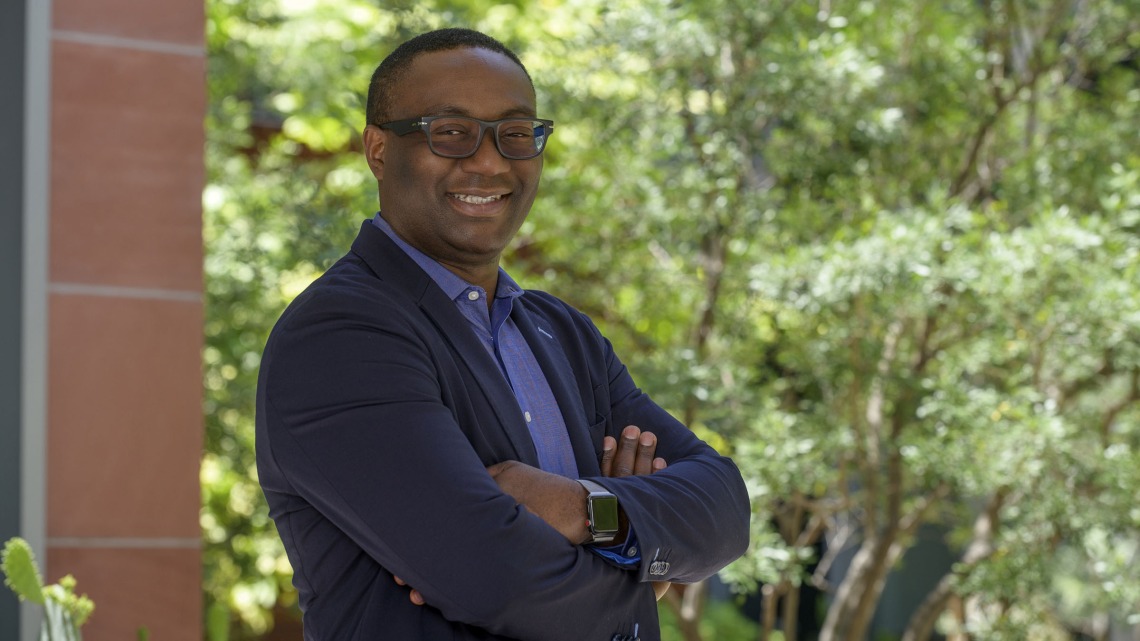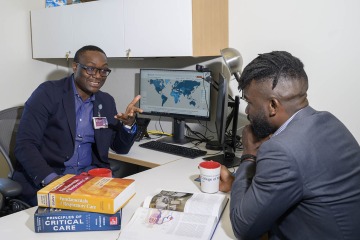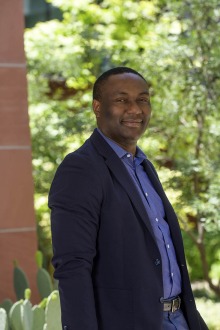Mission doctor’s devotion motivates Dr. Christian Bime
Global health care coalition arises to bridge the gaps in underserved nations and help people receive needed chronic illness care.

Christine Bime, MD, is committed to making an impact globally, particularly in resource-challenged areas of the world, by building collaborations starting in Tucson.
Growing up, Christian Bime, MD, an associate professor of medicine in the University of Arizona College of Medicine - Tucson, often heard his mother Josephine tell a story about his birth. While she was pregnant, she came to know Dr. Leslie Chaffee, a Canadian physician who had dedicated his life to the mission hospital near her home in Cameroon. Dr. Chaffee died unexpectedly while Josephine was pregnant. To honor him, she attended his funeral. After the service, though, Josephine suddenly went into labor.

Christian Bime, MD, meets with Atehkeng Zinkeng, a medical student from Cameroon, in his office.
Throughout his childhood, young Christian would see Dr. Chaffee’s gravesite and think about that story. It set in his heart a resolve: If a doctor from another country could devote his life to a community halfway around the world, even until his final moments, then he, too, would do his best to make a difference when the opportunity arose.
Keeping that commitment, Dr. Bime, who is also an associate professor in the Clinical Translational Sciences Graduate Program and medical director of the medical intensive care unit at Banner – University Medical Center Tucson, has embarked on a mission of his own: to create an international coalition of health care professionals to address significant gaps in data, education and capacity to treat critical care conditions across Africa.
Newly emerging priorities
Historically, health care work in developing countries has focused on infectious diseases. AIDS killed 2 million people a year in Sub-Saharan Africa at the peak of that crisis in the mid-2000s. In the last decade, an outbreak of Ebola in West Africa took more than 28,000 lives over two years.
Chronic health conditions, even potentially fatal diseases, have taken a back seat to the urgency of fast-spreading infections. While infectious diseases still present significant challenges, physicians are increasingly calling attention to chronic health issues and the need to build health care capacity in low- and middle-income countries, Dr. Bime said.
“Over the past 20 years, there has been a growing recognition of a demographic and economic shift in Sub-Saharan Africa,” Dr. Bime said. “The middle class is growing, although poverty still persists. Life expectancy is increasing – slowly, but it is increasing. And with that we are also recognizing the disparities that exist both within countries and on a global scale, in terms of the capacity to understand and treat health issues that previously have not been a priority.”
The problems of data
Addressing those disparities in critical care – that is, intensive care for life-threatening conditions – begins with fully understanding them. Accurate data on aspects of health and medicine, including disease prevalence and care capacity, is lacking in many African countries, he said, making it difficult to assess, let alone redress, challenges effectively.
“In my experience, if you want to know what is happening in some African countries related to critical care for non-infectious diseases, there is no website under the Ministry of Public Health that you can go to for that information. They just don’t have it,” Dr. Bime said. The challenges are myriad, but many stem from miscommunication and misunderstandings, Dr. Bime explained, citing an example from his home country, where French and English are the official languages.
He recounted a recent report he read claiming that Cameroon had 3,000 intensive care unit beds. “That's just not true. I know because they don't even have an ICU doctor there.” He posits language is at the root of the error. For example, the French service de réanimation translates roughly to “intensive care unit” in English, but for a health administrator in Cameroon, that was likely understood to simply mean spaces for stabilizing patients for a few hours following surgery.
Deficits in care capacity
Of course, pernicious gaps in data are a problem layered atop the core issue of deficient critical care. “In an ICU in the United States, it's very easy for me to put a patient on a ventilator and treat them for three days or three months,” Dr. Bime said. “But in some countries of the world, that's not really available. You may not have anybody

Christian Bime, MD
with my skill set in the entire country. And even if they exist, they may not have the necessary support staff. You need nurses that are trained appropriately, respiratory therapists, appropriate nutritionists and ICU pharmacists, oxygen supplies – there are so many needs that become very, very onerous in a resource-poor setting.”
The example illustrates how steep the challenge of improving critical care globally will be for health issues routinely treated in more industrialized nations: stroke, coronary artery disease, heart failure, chronic kidney disease and more. And in a vicious cycle, that inability to care for – or even correctly diagnose – conditions further degrade our understanding of critical care capacity.
“If you are unable to even make the diagnosis, to say nothing of treating the problem, then you can’t correctly count it,” Dr. Bime pointed out. “If somebody drops on the street, you're not going to know what they died of. Even if that patient ended up in your hospital, if the hospital is not equipped to measure their oxygen or perform other diagnoses, they will never know what they died of.”
Stakeholders around the world
Beyond the altruism intrinsic to the medical profession, Dr. Bime noted that people in countries with advanced care are stakeholders in this undertaking. Holes in the medical safety net present risks for an increasingly interconnected world. “People in industrialized countries – economists, engineers, researchers – they have to travel the world,” Dr. Bime said. “With that travel comes risk. Do you really want to go somewhere and die of sepsis just because that country was ill equipped to provide even basic care?”
“Over the past 20 years, there has been a growing recognition of a demographic and economic shift in Sub-Saharan Africa.”
Christian Bime, MD
Medical science the world over also stands to gain from genetic data untapped in Africa, especially for understanding risk factors for disease. Most of the genetic data that exists today comes from white people in the U.S. and Western Europe, a population that has less genetic variations than among Black people in the U.S. and, as evidenced by comparative studies of genetic diversity, far less variation than among Black people in Africa.
“A lot of the information that we have on genetic risk is incomplete,” Dr. Bime said. “But if you could look at the genetic risk factors across a much more comprehensive pool of genetic heritability, then you would capture the majority of them. It would serve the scientific community if we started expanding that work to Sub-Saharan Africa.”
Partnering for change
In May 2023, Dr. Bime launched the early stages of establishing a global Critical Care Center in Tucson, beginning to build collaborations among colleagues at the University of Arizona and researchers across the U.S. At the same time, he is working to solidify partnerships in Cameroon, Ethiopia, Ghana, Kenya, Niger, Nigeria, Rwanda, South Africa and Tanzania to train scientists to collect high-quality data, analyze disease patterns, and publish findings. Across the board, the initiative will create hands-on learning opportunities for health care students and postdocs.
Initial work will focus on accurately assessing and documenting critical care capacity using a checklist provided by the World Federation of Intensive and Critical Care. Longer-term, Dr. Bime will chip away at the entangled challenges of critical care, including building capacity through training programs, a few of which already exist in Africa. The initiative will work to steadily expand the small number of doctors and nurses getting that training, as well as build from ground zero the very concept of respiratory therapists as a care profession.
It will be a long journey, but Dr. Bime’s optimism for the work is not the unworldly idealism of a little boy in Cameroon who resolved to make a difference. It is grounded in the measured observations of a doctor at the top of his field.

